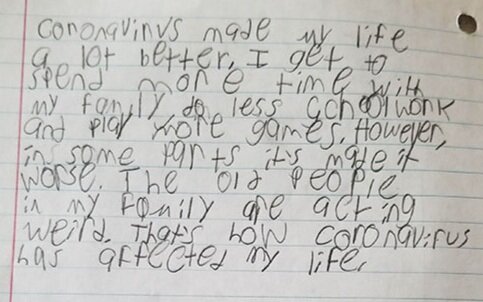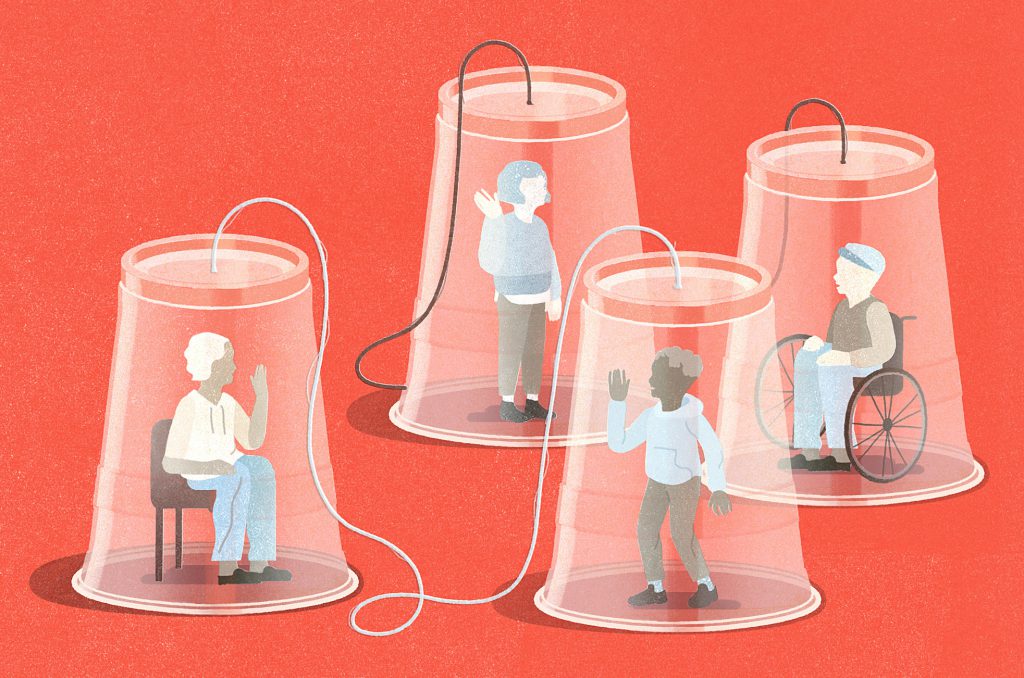Church BC and AC
May 30, 2020
Sufficient Grace
“Have I ever had an original thought,” I asked myself. “Probably not,” I replied.

[Coronavirus made my life a lot better. I get to spend more time with my family, do less schoolwork and play more games. However, in some parts it’s made it worse. The old people in my family are acting weird. That’s how Coronavirus has affected my life. Gordon Jeter – 4th Grade]
Why would someone who grew up as a Fundamental Baptist, went to the same Bible College as Jerry Falwell did, graduated from a biblically conservative seminary and has since pastored only theologically conservative, evangelical churches find himself staying for the whole (nearly an hour) of an online Roman Catholic Mass celebrated by Timothy Cardinal Dolan at Saint Patrick’s Cathedral?…Good (long) question!
The short answer is, “the Corona Virus!” As the fourth-grade writer I cited above suggested, it has brought change into our lives. For some of us, and not just “old people,” as he suggests, it has made us, “weird.”
The longer answer is, that I was snooping to see how a church in which a person is told they need to physically “receive communion” in order to maintain relationship with God was going to pull that off. How would they do it and maintain “social distancing” as they claimed they could and would?
The bell rang signifying the time in the service when their belief is that a miracle had taken place. The bread and the wine had been “transformed” so that they were now the sacramentally effective body and blood of Christ. The Cardinal broke the host and ate. He drank the wine. Then, he deftly swept the fallen crumbs from the broken bread into the chalice holding the remaining wine.
Ok, this is what I was waiting for. How will they do this?
I felt cheated in my quest. A lesser functionary then stepped to a microphone and explained that “In times like these, canon law allows for a ‘spiritual’ communion. That is, when worshippers can’t take the actual bread and wine physically, they can ‘take it in their hearts’.”
Now my question was, “Why then, did these folks need to come to this building that Sunday to watch a Cardinal eat and drink the bread and wine?” Evidently they, technically, did not. Sadly, I had received no logistical insights from watching some of the masters at doing “church-service” logistics.
However, I must admit, I still learned something. Apart from the one song, specifically worshipping Mary, I was blessed by the music that all focused on the glory and majesty of God—blessed at least when they remembered to turn off the Cardinal’s microphone so that his singing was muted. Singing the biblical truth of God, in a Roman Catholic Mass was productive even in “Baptistic” me—even when they were singing unfamiliar lyrics to unfamiliar tunes.
But, again, confusedly, I realized I didn’t have to go to that building and be there physically to “participate” in that aspect of worship. I was, after all, watching electronically. Why do we go to church?

You often hear me say, “We can’t go to church. We are the church!” Of course—wink wink—that is a simplistic statement used for clarity and force. Words like “church” have different nuances in different contexts. We still know what someone means when they call a building “a church.” We still think in terms of “going to church” on Sundays.” Maybe thinking long and hard about how an ecclesiastical edifice and a repeated Sunday practice came to be called by the word “church,”—maybe asking how this happened would help me answer the questions that I have been asking myself and the rest of the FBC elders—and they have been asking me:
“Why DO we go to church?” And, “Why do we ‘go to church’ in a building we call a ‘church’?”
I bet that, as Sunday at 10:30 AM rolls around and one more week of not meeting together goes by, many of you, for at least a moment, ask, “Why do I go to church? Why do I miss it? Or… Why don’t I miss it?
What did “church” mean to me BC? Should it mean the same thing AC? What was church to me before Corona and will church be the same to me after Corona?
Raleigh
The Other Infection
March 23, 2020
Sufficient Grace
“Have I ever had an original thought,” I asked myself. “Probably not,” I replied.

I was “chuffed” to find myself in good company at a confusing time and feeling weak.
A blog I often read (“Musings on Science and Theology” by the “Jesus Creed” guy, Scot McKnight) pointed me to an article in “The Atlantic” (which I don’t often read) by Francis Collins, director of the National Institutes of Health. All this should give sufficient credit where credit is due.
I was “chuffed” because a respected scientist who trusts Jesus, even as he leads many who do not believe, through a tough time for them, had struggled with the same biblical truth that it took me a long time to accept and I’m still learning daily to live.
2 Corinthians 12:9…
New International Version
But he said to me, “My grace is sufficient for you, for my power is made perfect in weakness.” Therefore I will boast all the more gladly about my weaknesses, so that Christ’s power may rest on me.
New Living Translation
Each time he said, “My grace is all you need. My power works best in weakness.” So now I am glad to boast about my weaknesses, so that the power of Christ can work through me.
English Standard Version
But he said to me, “My grace is sufficient for you, for my power is made perfect in weakness.” Therefore I will boast all the more gladly of my weaknesses, so that the power of Christ may rest upon me.
They all say pretty much the same thing. Somehow, it is OK when I am weak in ways that irk me or even scare me. Somehow it is even better than OK. Somehow it is a good thing that allows Christ to work through me. If you are studying Genesis with us, somehow my weakness is antidote to the other current pandemic of “ambitious autonomy” that infects all us humans already. The map tracing the spread of infection for that virulent disease would have to be a solid red across the whole human world!
If you have time and the inclination today or during the week, skim back through the chapters we have already considered in Genesis. Watch the “sin virus” spread—the pandemic of “ambitious autonomy.” From the Serpent to Eve to Adam, “We are going to do this our own way, God!” From there to the first family and then on from there as families and lineages grew. Genesis gets pretty dark very quickly as humans spread the disease of sin and death instead of LIFE producing righteousness. The map of infection is clear. What will stop this infection? Are we humans able to fix it. Bob the Builder would have to change his tune to “no we can’t!”
I suspect the Apostle Paul was a smart guy and likely quite self-sufficient when he chose to be. So, God said, because I love you, Paul, let me leave you with a reminder—a different sort of Jacobian limp—an irritating “thorn in your flesh.” This prickly, annoying thorn you are unable to tweeze-out will remind you that you cannot do everything. Eventually, you will learn you can’t truly do anything—anything of lasting value–autonomously. “For when I am weak, then I am strong,” the apostle finally concluded.
I suspect Paul did not explicitly expose the nature of his “thorn” to us not just because the Corinthians were already aware of it. I suspect God let him be generic so our frightening “thorns” could fill out the application of the truth—“My power works best in weakness.”
The world is scared to death of our collective human weakness these days. You can easily tell this when powers, politicians, and popular spokes-people lie to cover-up the irritating weakness-thorns embedded in their flesh. Sometimes I believe they believe it all depends on them and that, deep down in times like these, is what scares them the most. This is when “ambitious autonomy” bites back the hardest. Candidly, everyone knows it is a lie. No one wants to say so. So people get edgy , angry, and hoard toilet paper as a feel-better “fix.”
I doubt that Dr. Francis Collins, who knows this truth, would suggest we are simply to pray and pass out miraculous, healing-hankies to beat the “Coronas.” I bet he thinks even unbelieving scientists should work hard at material cures for what ails us so viciously today. But, I would also bet he reminds himself that God taught Paul, “My power works best in human weakness.”
May more and more humans find protection and cure from Covid-19. May the fear and anxiety it brings make more and more humans aware of that other disease that infects us all—our desire to be strong autonomously. May we be there for people, ourselves pricked by our own reminding-thorns, to tell them that in Jesus Christ, “…when I am weak then I am strong.”
…by God’s grace alone, through simple faith alone, in Jesus Christ alone

